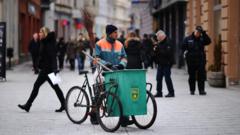In the heart of Bosnia and Herzegovina, Sarajevo is once again grappling with a resurgence of its rodent population. Social media has become a digital tapestry, showcasing images of rats swimming in the Miljacka River, thereby highlighting the issue that continues to plague the city. Discontent among residents is growing, particularly as overflowing garbage containers and instances of illegal dumping persist. Complaints are flooding in about the failure of local authorities to promptly address the removal of dead animals from public spaces, including playgrounds for children.
This unsanitary environment has led to a worrying rise in rat-borne diseases, leading health professionals to sound the alarm. In a stark report from the country's largest hospital, a dozen new cases of leptospirosis were recorded in just 24 hours. Leptospirosis, often referred to as rat fever, can spread to humans through contact with water or soil contaminated by rodent excreta, leading to symptoms ranging from mild headaches to severe complications like bleeding in the lungs and kidney failure.
In response to the public health threat, city officials have declared a sanitation emergency, instituting measures that have long been neglected. Extra workers equipped with disinfectants are now deployed for a thorough cleanup of public areas, while additional waste collection services are being organized. Schools are also taking a proactive stance, directing staff to tidy playgrounds, trim grass, and inspect their facilities for rodent presence.
This vigorous response marks a dramatic shift from the previous two years, where pest control measures were virtually non-existent. Local officials attribute this lapse to a failed tender process regarding extermination and sanitation efforts, which contributed to the current rodent crisis, compounded by the presence of stray dog packs.
Describing the unfolding situation as a "communal crisis," Sarajevo Canton Health Minister Enis Hasanovic criticized the local authorities for neglecting vital public health responsibilities. However, former head of Sarajevo's University Clinical Centre, Sebija Izetbegović, who now serves in the local assembly, warns that with the current population of "well-fed rats," the city could soon face additional threats, including hantavirus infections.
While none of the reported leptospirosis cases have escalated to severe illness yet, the potential for a health disaster remains, as untreated leptospirosis can have a mortality rate exceeding 50% in severe cases.






















